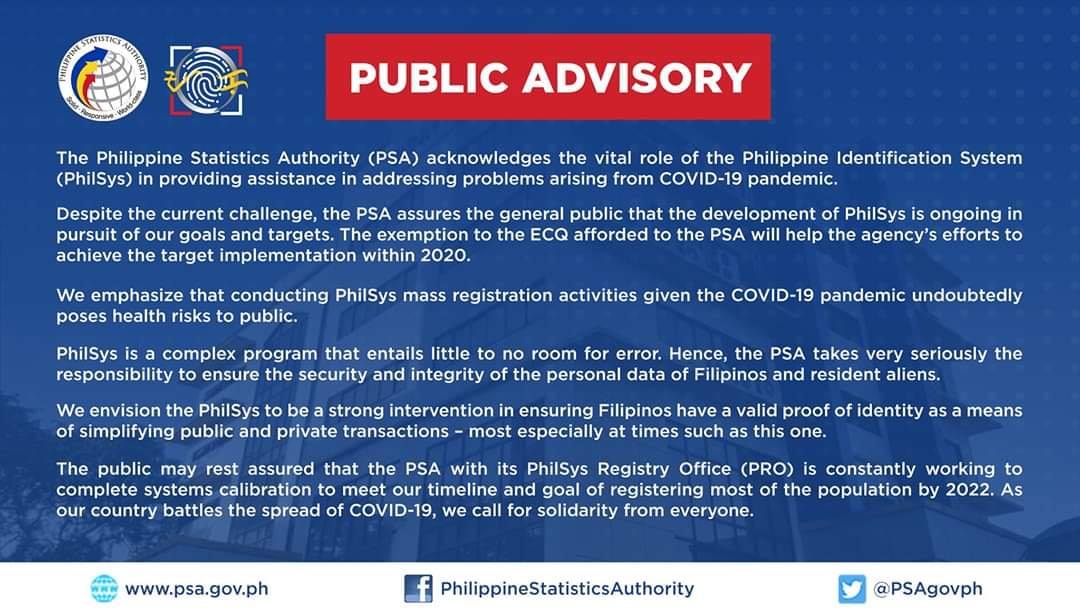
The Philippine Statistics Authority (PSA) acknowledges the vital role of the Philippine Identification System (PhilSys) in providing assistance in addressing problems arising from the Coronavirus disease 2019 (COVID-19) pandemic.
We envision the PhilSys to be a strong intervention in ensuring Filipinos have a valid proof of identity as a means of simplifying public and private transactions - most especially at times such as this one. This is the very reason why Republic Act 11055 was passed and why the government wants to embark on such an ambitious and transformative project.
The PSA further clarifies that, as a foundational ID system, the PhilSys registry, once fully operational, is intended to help enhance other government databases by basing their identity verification and deduplication with the PhilSys. We emphasize that processes beyond identity verification such as authorization and identification of beneficiaries remain fully with the implementing agency/party. The PhilSys may only complement said implementation by adhering to its core function of providing a yes- no response to verify the identity of an individual.
Once the end-to-end system is in place, the PhilSys is envisioned to:
- Promote seamless delivery of service (in the distribution of relief goods)
- Strengthen financial inclusion (in the distribution of relief allowances to vulnerable sectors)
- Reduce corruption (in the implementation of emergency reform and budget release)
- Promote ease of doing business (with government agencies come recovery and rebuilding period)
As such, we underscore that the PhilSys is a complex program that entails little to no room for error. Hence, the PSA takes very seriously the responsibility to ensure the security and integrity of the personal data of Filipinos and resident aliens. The PSA subscribes to careful and precise planning and a rigorous procurement procedure to ensure the efficiency of our processes, security of data, and functionality of the PhilSys. The responsibility of handling personal data, ensuring its safety and security, and protecting its integrity is of prime priority which requires ample time and utmost effort to deliver PhilSys seamlessly to the public.
Despite the current challenge, the PSA assures the general public that the development of PhilSys is ongoing in pursuit of our goals and targets. The exemption to the ECQ afforded to the PSA will help the agency's efforts to achieve the target implementation within year 2020.
We are pleased to report that significant progress has been made toward the establishment of the PhilSys. Registration kits have already been procured; our partnerships with the Bangko Sentral ng Pilipinas (BSP) for the PhilID card production and the Department of Information Communications and Technology (DICT) for data centers and technical assistance are established; and substantial advancements in the procurement of our systems have also been achieved. We will also make due adjustments to our registration protocols in light of COVID-19 and bank on our pre- registration system for an orderly registration once we open it to the public.
The public may rest assured that the PSA with its PhilSys Registry Office (PRO) is constantly working to complete systems calibration to meet our timeline and goal of registering most of the population by 2022. As our country battles the spread of COVID-19, we call for solidarity from everyone.
CLAIRE DENNIS S. MAPA, Ph.D.
Undersecretary
National Statistician and Civil Registrar General

